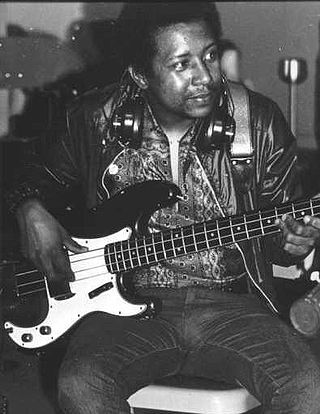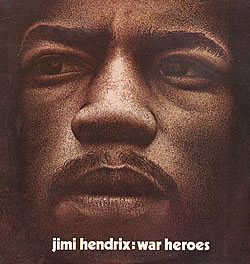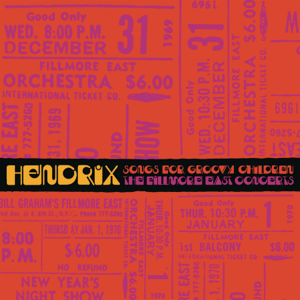Related Research Articles

Band of Gypsys is a live album by Jimi Hendrix and the first without his original group, the Jimi Hendrix Experience. It was recorded on January 1, 1970, at the Fillmore East in New York City with Billy Cox on bass and Buddy Miles on drums, frequently referred to as the Band of Gypsys. The album mixes funk and rhythm and blues elements with hard rock and jamming, an approach which later became the basis of funk rock. It contains previously unreleased songs and was the last full-length Hendrix album released before his death six months later.

First Rays of the New Rising Sun is a compilation album credited to American rock musician Jimi Hendrix, issued in April 1997 on MCA Records. Featuring songs mostly intended for his planned fourth studio album, it was one of the first releases overseen by Experience Hendrix, the family company that took over management of his recording legacy. It reached the album charts in the United States, United Kingdom, and four other countries.

George Allen "Buddy" Miles Jr. was an American composer, drummer, guitarist, vocalist and producer. He was a founding member of the Electric Flag (1967), a member of Jimi Hendrix's Band of Gypsys (1969–1970), founder and leader of the Buddy Miles Express and later, the Buddy Miles Band. Miles also played and recorded with Carlos Santana and others. He also sang lead vocals on the California Raisins claymation TV commercials and recorded two California Raisins R&B albums.
Blues is a compilation album of blues songs recorded by American singer/songwriter/musician Jimi Hendrix. Compiled by interim Hendrix producer Alan Douglas, it was released April 26, 1994, by MCA Records. The album contains eleven songs recorded by Hendrix between 1966 and 1970, six of which were previously unreleased. Hendrix wrote seven of the pieces; other writers include Muddy Waters, Booker T. Jones, and Elmore James. Most are demos, jams, and live recordings, which Hendrix may or may not have completed for release.

William "Billy" Cox is an American bassist, best known for performing with Jimi Hendrix. Cox is the only surviving musician to have regularly played with Hendrix: first with the experimental group that backed Hendrix at Woodstock, followed by the trio with drummer Buddy Miles that recorded the live Band of Gypsys album, and, lastly, The Cry of Love Tour trio with Mitch Mitchell back on drums. Cox continues to perform dates with the Band of Gypsys Experience and the Experience Hendrix Tour.

Kiss the Sky is a compilation album by American rock guitarist, singer–songwriter Jimi Hendrix. In the US, it was released by Reprise Records in October 1984 and by Polydor Records in the UK in November 1984. The album's title is taken from the lyrics of "Purple Haze."

War Heroes is a compilation album by American guitarist Jimi Hendrix. Released in the UK in October 1972, and in December 1972 in the US, it was the third album of mostly unreleased studio recordings to be issued after Hendrix's death. The album was engineered, mixed and compiled by Eddie Kramer and John Jansen, although biographer and later Hendrix producer John McDermott also identifies Hendrix as a producer.
"Stone Free" is a song written by Jimi Hendrix and the second song recorded by the Jimi Hendrix Experience. It has been described as a "counterculture anthem, with its lyrics praising the footloose and fancy-free life", which reflected Hendrix's restless lifestyle. Instrumentally, the song has a strong rhythmic drive provided by drummer Mitch Mitchell with harmonic support by bassist Noel Redding. "Stone Free" was issued on December 16, 1966, as the B-side of the Experience's first UK single "Hey Joe" and later included on the Smash Hits compilation album.

"Freedom" is a rock song by Jimi Hendrix that is often regarded as one of the most fully realized pieces he wrote and recorded in the months before his death. It incorporates several musical styles and the lyrics reflect various situations facing Hendrix at the time.

Voodoo Soup is a posthumous compilation album by American rock musician Jimi Hendrix, released in the United States on April 11, 1995, by MCA Records. It was one of the last Hendrix albums produced by Alan Douglas, who was also responsible for the posthumous Hendrix releases Midnight Lightning and Crash Landing in 1975.

Rainbow Bridge is a compilation album by American rock musician Jimi Hendrix. It was the second posthumous album release by his official record company and is mostly composed of recordings Hendrix made in 1969 and 1970 after the breakup of the Jimi Hendrix Experience. Despite the cover photo and subtitle Original Motion Picture Sound Track, it does not contain any songs recorded during his concert appearance for the 1971 film Rainbow Bridge.

The Singles Collection is a posthumous compilation album by Jimi Hendrix, released in 2003 by MCA Records. The album is made up of ten discs, each of which contains one single released by Hendrix, including some after his death.

The Cry of Love Tour was a 1970 concert tour by American rock guitarist and singer Jimi Hendrix. It began on April 25, 1970, at the Forum in Inglewood, California, and ended on September 6, 1970, at the Love & Peace Festival in Fehmarn, West Germany. The majority of the 37 shows were in the United States, with two each in Sweden, Denmark, and West Germany, and one in England, where Hendrix was the final act at the Isle of Wight Festival 1970.
"Ezy Ryder" is a song written and recorded by American musician Jimi Hendrix. It is one of the few studio recordings to include both Buddy Miles on drums and Billy Cox on bass, with whom Hendrix recorded the live Band of Gypsys album (1970).

"Hear My Train A Comin'" is a blues-based song written by Jimi Hendrix. Lyrically, it was inspired by earlier American spirituals and blues songs which use a train metaphor to represent salvation. Hendrix recorded the song in live, studio, and impromptu settings several times between 1967 and 1970, but never completed it to his satisfaction.
American guitarist Jimi Hendrix intended to release his fourth studio album as a double or triple LP before Christmas 1970. From June to August 1970, he made good progress on the realization of the planned album in his new Electric Lady Studios. Many songs were mixed on 20, 22 and 24 August. Four of these mixes were regarded as definitive versions and were presented at the opening party of Electric Lady on 26 August. Hendrix died on 18 September that year, leaving behind an enormous number of unreleased recordings in various stages of completion. It is impossible to know what Hendrix would have changed and what he actually would have released, but there is some documentation of the album configurations he had in mind. While a good amount of the designated tracks only needed some finishing touches, others only existed as rough recordings, and for some titles no recordings are known to exist. The Cry of Love (1971), Voodoo Soup (1995) and First Rays of the New Rising Sun (1997) are officially released attempts to reconstruct the planned album. First Rays of the New Rising Sun is usually regarded as closest to Hendrix's vision, but features a track that was probably never part of Hendrix's plans and omits some tracks that were definitely considered. All but one of the tracks that are known to have been recorded for the album have eventually been released in some form on official albums.
"Night Bird Flying" is a rock song written by Jimi Hendrix. It is a complex piece with multiple guitar parts and reflects a variety of styles. Lyrically, Hendrix continues to explore an idealized feminine figure, as in his 1967 song "Little Wing".
"Hey Baby (New Rising Sun)" or simply "Hey Baby" is a song written and recorded by American musician Jimi Hendrix, from his second posthumous album Rainbow Bridge (1971). The song is a slower and more melodic piece, which features the prominent use of chorus- and tremolo-effects on guitar. Hendrix uses an idealized feminine figure that recurs in several of his lyrics. Commentators have seen the song as representative of his post-Band of Gypsys musical direction.

Songs For Groovy Children: The Fillmore East Concerts is a chronologically sequenced collection of American musician Jimi Hendrix's 1969–1970 New Years recorded performances at the Fillmore East in New York City. It was released as a box set of five-CDs on November 22, 2019 and an eight-LP set on December 13.
References
- 1 2 McDermott, John; Kramer, Eddie; Cox, Billy (2009). Ultimate Hendrix. New York City: Backbeat Books. pp. 173, 185. ISBN 978-0-87930-938-1.
- 1 2 3 4 "The Jimi Hendrix Encyclopedia". Experience Hendrix. Retrieved 2008-07-12.
- ↑ Shapiro, Harry; Glebbeek, Cesar (1990). Jimi Hendrix: Electric Gypsy . St. Martin's Press. p. 553. ISBN 0-312-05861-6.
- ↑ Voodoo Child: The Jimi Hendrix Collection (Album notes). Jimi Hendrix. MCA. 2001. p. back cover. 088 112 603-2.
{{cite AV media notes}}: CS1 maint: others in cite AV media (notes) (link) - ↑ "Single Reviews" (PDF). Record World. April 25, 1970. p. 8. Retrieved 2023-04-29.
- ↑ Fairchild, Michael (1995). Voodoo Soup (Album notes). Jimi Hendrix. MCA. p. 12. MCAD-11236.